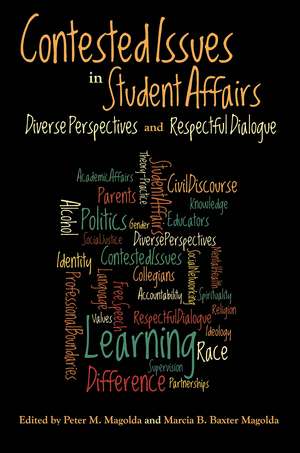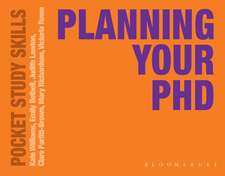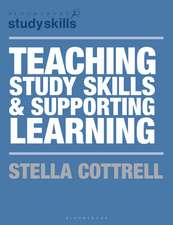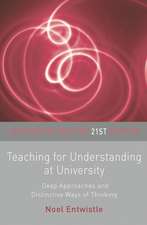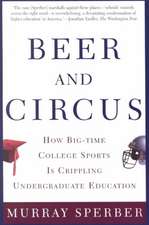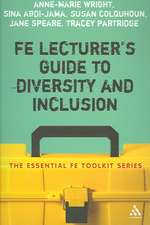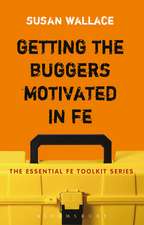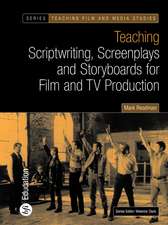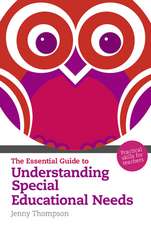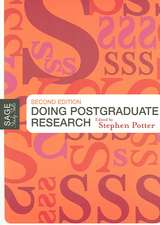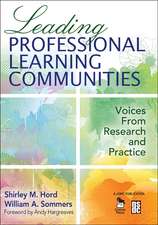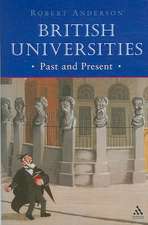Contested Issues in Student Affairs: Diverse Perspectives and Respectful Dialogue
Editat de Peter M. Magolda, Marcia B. Baxter Magoldaen Limba Engleză Paperback – 22 aug 2011
| Toate formatele și edițiile | Preț | Express |
|---|---|---|
| Paperback (1) | 317.82 lei 43-57 zile | |
| Taylor & Francis – 22 aug 2011 | 317.82 lei 43-57 zile | |
| Hardback (1) | 1174.41 lei 43-57 zile | |
| Taylor & Francis – 22 aug 2011 | 1174.41 lei 43-57 zile |
Preț: 317.82 lei
Preț vechi: 334.55 lei
-5% Nou
Puncte Express: 477
Preț estimativ în valută:
60.82€ • 63.27$ • 50.21£
60.82€ • 63.27$ • 50.21£
Carte tipărită la comandă
Livrare economică 14-28 aprilie
Preluare comenzi: 021 569.72.76
Specificații
ISBN-13: 9781579225841
ISBN-10: 1579225845
Pagini: 498
Dimensiuni: 152 x 229 x 38 mm
Greutate: 0.73 kg
Ediția:1
Editura: Taylor & Francis
Colecția Routledge
Locul publicării:Oxford, United Kingdom
ISBN-10: 1579225845
Pagini: 498
Dimensiuni: 152 x 229 x 38 mm
Greutate: 0.73 kg
Ediția:1
Editura: Taylor & Francis
Colecția Routledge
Locul publicării:Oxford, United Kingdom
Public țintă
PostgraduateCuprins
ACKNOWLEDGMENTS PREFACE. Peter Magolda and Marcia Baxter Magolda, Miami University 1. WHAT COUNTS AS “ESSENTIAL” KNOWLEDGE FOR STUDENT AFFAIRS EDUCATORS? Intellectual Curiosity and Lifelong Learning—Marcia Baxter Magolda & Peter Magolda, Miami University Response—Jill Carnaghi, Washington University in St. Louis & Victor Boschini, Texas Christian University 2. HOW DOES THE PERCEPTION THAT LEARNING TAKES PLACE EXCLUSIVELY IN CLASSROOMS PERSIST? Expanding the Learning Environment—Mimi Benjamin, Cornell University & Florence Hamrick, Rutgers University Response—Laura Blake Jones, University of Michigan 3. HOW ARE DICHOTOMIES SUCH AS SCHOLAR-PRACTITIONER AND THEORY-PRACTICE HELPFUL AND HARMFUL TO THE PROFESSION? Developing Professional Judgment—Gregory Blimling, Rutgers University Response—Ellen Broido, Bowling Green State University 4. IF STUDENT AFFAIRS-ACADEMIC AFFAIRS COLLABORATION IS SUCH A GOOD IDEA, WHY ARE THERE SO FEW EXAMPLES OF THESE PARTNERSHIPS IN AMERICAN HIGHER EDUCATION? Transforming Our Approach to Education. Cultivating Partnerships and Dialogue—Victor Arcelus, Gettysburg College Response—Jamie Lester, George Mason University PART TWO. CHALLENGES OF PROMOTING LEARNING AND DEVELOPMENT 5. IN THIS AGE OF CONSUMERISM, WHAT ARE THE IMPLICATIONS OF “GIVING STUDENTS WHAT THEY WANT?” Have it Your Way U—Tracy Davis, Western Illinois University Response—Lisa Boes, Harvard University 6. WHAT ARE THE RISKS AND BENEFITS ASSOCIATED WITH ALLOWING STUDENTS TO FAIL IF LEARNING RESULTS? Creative Learning for Challenging Times. The Promise and Peril of Risk—Michele Welkener, University of Dayton Response—Kelsey Ebben Gross, Central New Mexico Community College 7. DOES SOCIAL NETWORKING ENHANCE OR IMPEDE STUDENT LEARNING? Social Networking and Student Learning. Friends without Benefits—Mark R. Connolly, University of Wisconsin—Madison Response—Ana Martinez Aleman, Boston College 8. WHAT IS THE RELATIONSHIP BETWEEN CHANGING UNIVERSITY POLICY AND CHANGING STUDENT NORMS? Where Policy Meets Student Behavior—Jonathan Poullard, University of California, Berkley Response—J. Michael Denton, Miami University. 9. IF CURBING ALCOHOL ABUSE ON COLLEGE CAMPUSES IS AN “IMPOSSIBLE DREAM,” WHY BOTHER WITH INTERVENTIONS AIMED AT CURBING ABUSE? Navigating the Drinking Culture to Become Productive Citizens—James P. Barber, College of William and Mary Response—Heidi Levine, Cornell College 10. WHAT SHOULD UNIVERSITIES DO ABOUT OVERLY INVOLVED PARENTS? Aiming to Redefine, not Restrict, Parental Involvement. How to Foster Developmentally Effective Parent-Student Partnerships—Kari Taylor, Miami University Response—John Lowery, Indiana University of Pennsylvania 11. IN THIS AGE OF ACCOUNTABILITY, WHAT COUNTS AS GOOD; AND HOW DO WE KNOW IF STUDENT AFFAIRS EDUCATORS “REALLY” MAKE A DIFFERENCE IN THE LIVES OF STUDENTS? Student affairs in the Age of Accountability and Assessment—Jillian Kinzie, Indiana University, Bloomington Response—Andrew Wall, University of Rochester 12. WHY IS IT SO CHALLENGING FOR COLLEGIANS AND STUDENT AFFAIRS EDUCATORS TO TALK ABOUT RACE? The Elephant in the Room—Race—Julie J. Park, Miami University Response—Christopher Mundell, Columbus College of Art and Design 13. DO IDENTITY CENTERS (E.G., WOMEN’S CENTERS, ETHNIC CENTERS, LGBT CENTERS. DIVIDE RATHER THAN UNITE HIGHER EDUCATION FACULTY, STUDENTS, AND ADMINISTRATORS? IF SO, WHY ARE THEY SO PREVALENT ON COLLEGE CAMPUSES? Identity Centers. An Idea Whose Time Has Come...and Gone?—Kristen A. Renn, Michigan State University Response—Lori Patton Davis, University of Denver 14. WHAT DOES IT MEAN TO “ACT AFFIRMATIVELY” IN HIRING PROCESSES? Diversity as a Strategic Imperative in Higher Education—Karen E. Miller and J. Douglas Toma, Institute of Higher Education, University of Georgia Response—Patricia King, University of Michigan 15. GIRL OR WOMAN?…DORM OR RESIDENCE HALL? …WHAT’S THE BIG DEAL ABOUT LANGUAGE? The Power of Language—Stephen John Quaye, University of Maryland Response—Ebelia Hernandez, Rutgers University 16. WHAT ARE THE IMPLICATIONS OF PROVIDING “SPECIAL” CONSIDERATIONS TO PARTICULAR STUDENTS? " Special” Considerations for a Universal Problem. Campus Accommodations—Deborah McCarthy, University of South Florida Response—Peter Haverkos, Miami University—Hamilton 17. WHAT ARE THE RESPONSIBILITIES AND LIMITS OF STUDENT AFFAIRS EDUCATORS’ ROLE IN ADDRESSING BURGEONING STUDENT MENTAL HEALTH ISSUES? Supporting Collegians’ Mental Health. Collaboration and Role Differentiation—David B. Spano, University of North Carolina at Charlotte Response—Paul Oliaro, California State University at Fresno & Lori Varlotta, California State University at Sacramento 18. WHAT ROLES SHOULD STUDENT AFFAIRS EDUCATORS PLAY IN ATTENDING TO STUDENTS’ RELIGIOUS AND SPIRITUAL NEEDS? Creating Space for Spirituality and Religion in Student Affairs Practice. Alyssa N. Bryant, North Carolina State University Response. Michele Murray, Seattle University & Robert Nash, University of Vermon 19. HOW DO STUDENT AFFAIRS EDUCATORS PROTECT FREEDOM OF SPEECH WHILE ENSURING CIVIL DISCOURSE? Putting the Hammer Down. Tobias W. Uecker, Kenyon College Response. Katie Sardelli, Winthrop University IV. Organizing Student Affairs Practice for Learning and Social Justice 20. WHY IS THE GAP SO WIDE BETWEEN ESPOUSING A SOCIAL JUSTICE AGENDA TO PROMOTE LEARNING AND ENACTING IT? WHAT COULD STUDENT AFFAIRS EDUCATORS DO TO GENUINELY ENACT A SOCIAL JUSTICE IDEOLOGY? Moving Beyond Good Intentions. Joel D. Zylstra, Center for Transforming Mission Education Response. Nana Osei-Kofi, Iowa State University 21. WHAT WOULD STUDENT AFFAIRS ORGANIZATIONAL STRUCTURES LOOK LIKE IF THEY SUPPORTED INCLUSIVE, LEARNING-CENTERED PRACTICES? Advancing Inclusive and Learning-centered Practice. Redesigning Student Affairs Work. John P. Dugan, Loyola University Response. Tatiana Suspitsyna, The Ohio State University 22. WHAT FORMS WOULD SUPERVISION TAKE TO MODEL INCLUSIVE, LEARNING-ORIENTED PRACTICE? The Case for Developmental Supervision. Michael G. Ignelzi, Slippery Rock University Response. Patty Perillo, Davidson College 23. WHY DO STUDENT AFFAIRS EDUCATORS STRUGGLE TO SET PROFESSIONAL BOUNDARIES? Establishing and Maintaining Healthy Professional and Personal Boundaries. Kathleen (Kate. R. Linder, Indiana University of Pennsylvania Response. Kristina Mickel Clement, Georgia State University 24. HOW DO PROFESSIONALS NAVIGATE SITUATIONS WHEN THEIR PROFESSIONAL BELIEFS CLASH WITH THEIR SUPERVISORS’ OR ORGANIZATIONS’ BELIEFS? Engaging in Dialogues about Difference in the Workplace. Peter Magolda & Marcia Baxter Magolda, Miami University Response. Rozana Carducci, University of Missouri—Columbia CONTRIBUTORS INDEX
Notă biografică
Peter M. Magolda was Professor Emeritus in the Department of Educational Leadership at Miami University. He focused his scholarship on ethnographic studies of college students, critical issues in qualitative research, and program evaluation. He is author of The Lives of Campus Custodians and co-author of Contested Issues in Student Affairs, Contested Issues in Troubled Times, and It’s All About Jesus!: Faith as an Oppositional Collegiate Subculture, and has served on the editorial boards of Research in Higher Education and the Journal of Educational Research. He was an ACPA Senior Scholar inductee, and in 2013 received the Association for the Study of Higher Education (ASHE) Mentoring Award. He also received Miami University’s Richard Delp Outstanding Faculty Member award, as well Alumni Award from The Ohio State University and Indiana University. We deeply mourn the loss of author, teacher, and friend Peter M. Magolda. Marcia B. Baxter Magolda is Distinguished Professor Emerita, Miami University of Ohio and a nationally recognized author and speaker on student development and learning. She received the American College Personnel Association’s Lifetime Achievement Award in 2014, and the Association for the Study of Higher Education’s Research Achievement Award in 2007, for her outstanding contribution to advancing student learning. Her scholarship addresses the evolution of learning and development in college and subsequent adult life, and educational practice to promote self-authorship. Her seventh and eighth books respectively are Authoring Your Life and Development and Assessment of Self-Authorship.
Recenzii
"Offers essays and follow-up dialogue on 24 issues, including the student as consumer, whether social networking enhances or impedes student learning, student mental health, and what institutions should do about overly involved parents."
The Chronicle of Higher Education
"I read about the book when I realized that this book needed to be required reading for my graduate student affairs students. I also think it is an important stimulant for reflection for student affairs educators across the higher education organizational hierarchy. What is particularly poignant is how the second essayists expand on and even disagree with notions explored by the first essayists...This way of navigating a contested issue communicates that there is not just one right answer, but rather that through respectful dialogue others can add onto ideas in ways that synergistically futher understanding. It is not often that we witness our profession challenging, broadening, and clarifying questions in such an honest fashion...Regardless of its almost 500-page length, the smooth flow of the writing and format, the variety of perspectives presented, and the currency of the contested issues all offer a very thought-provoking and subsequently worthwhile read for graduate students in their preparation. This book will offer a sense of realities of student affairs practice. For that reason, professionals will also find this book useful as excellent fodder for professional development dialogue and reflection."
Journal of College Student Development
The Chronicle of Higher Education
"I read about the book when I realized that this book needed to be required reading for my graduate student affairs students. I also think it is an important stimulant for reflection for student affairs educators across the higher education organizational hierarchy. What is particularly poignant is how the second essayists expand on and even disagree with notions explored by the first essayists...This way of navigating a contested issue communicates that there is not just one right answer, but rather that through respectful dialogue others can add onto ideas in ways that synergistically futher understanding. It is not often that we witness our profession challenging, broadening, and clarifying questions in such an honest fashion...Regardless of its almost 500-page length, the smooth flow of the writing and format, the variety of perspectives presented, and the currency of the contested issues all offer a very thought-provoking and subsequently worthwhile read for graduate students in their preparation. This book will offer a sense of realities of student affairs practice. For that reason, professionals will also find this book useful as excellent fodder for professional development dialogue and reflection."
Journal of College Student Development
Descriere
What is your level of understanding of the many moral, ideological, and political issues that student affairs educators regularly encounter? What are the theoretical perspectives you might choose and why? How do your responses compare with those of colleagues?
